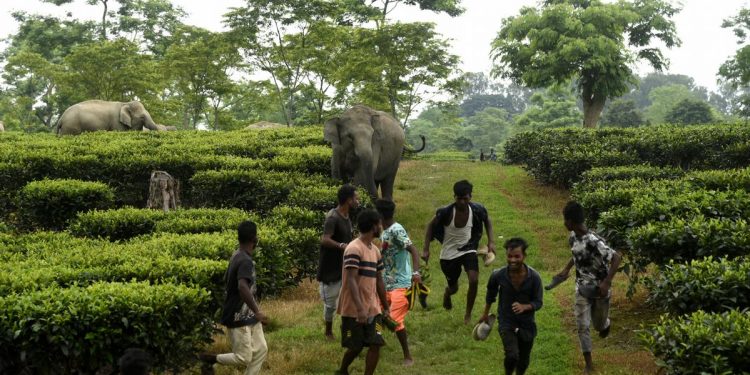New Delhi: Even as the government has increased the focus on the conservation of wildlife, instances of human-animal conflict have resulted in the loss of life of both in the last couple of decades. The worst sufferers among animals are elephants. A large number of elephants have lost their lives due to various reasons ranging from electrocution, poisoning, and accidents between 2019-20 and 2021-22 as per information available from the Union Ministry of Environment and Forest.
The ministry data said that a total of 198 elephants were killed by electrocution across India, 41 by trains, 27 by poachers and eight died by poisoning during the same period. On the other hand, a large number of human beings have also lost their lives in the same period due to elephant attacks. Elephants have killed 1,579 humans in three years – 585 in 2019-20, 461 in 2020- 21 and 533 in 2021-22. As far as the states are concerned, Odisha recorded the highest number of deaths in elephant attacks at 322, followed by Jharkhand at 291, West Bengal at 240, Assam at 229, Chhattisgarh at 183, and Tamil Nadu at 152.
So far as the deaths of elephants are concerned, out of the 198 caused by electrocution, Assam recorded 36, Odisha 30, and Tamil Nadu 29. Assam (15 out of 41) also had the highest number of elephant deaths caused by trains, followed by Odisha (eight) and West Bengal (five). Poaching deaths were the highest in Meghalaya (11) while poisoning deaths were the highest in Assam (seven). The Ministry while replying to a question in Parliament recently said that assessments of human-wildlife conflicts indicate that the main causes include habitat loss, growth of the population of wild animals, changes in cropping patterns that attract wild animals to farmlands, movement of wild animals from forests to human-dominated landscapes for food and fodder, movement of human beings to forests for illegal collection of forest produce, habitat degradation due to the growth of invasive alien species, etc.
The Parliament Standing Committee on Environment and Forests in its March, 2023 report took note of the human-animal conflict. The committee noted that Project Tiger and Project Elephant are crucial to the initiatives of the Ministry relating to wildlife conservation, not just from an ecological standpoint but also for its societal and economic value. “The initiatives of the Ministry, or the lack of it, have a direct bearing not just on the project but also on the human population living in these vulnerable areas.
With increasing reports of man-animal conflicts, it becomes even more important that the Ministry sharpens its focus on these projects and also allocates more funds for meeting necessary expenditures. The committee, therefore, recommends the Ministry ensures that funds allocated in 2022-23 be optimally utilised, the panel said in its report.






































